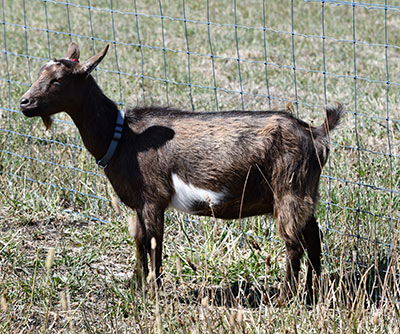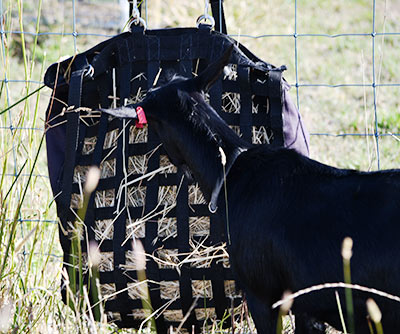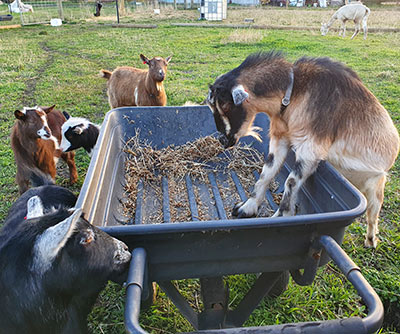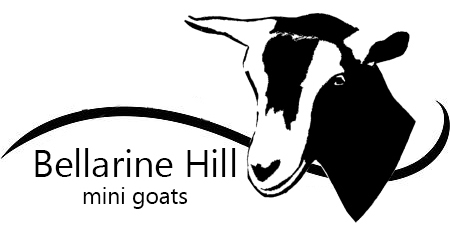Caring for Miniture Goats

Fencing
Secure fencing is a must with any goat. Fences should be high enough to prevent them from jumping over the fence, approx 1 metre high. We use sheep mesh attached to normal fencing wire with the smallest mesh size at the bottom. This prevents them from escaping through the wires and under the fence. Other forms of fence are fine provided that any gaps are not large enough for a goat to fit through. Securely closing gates are also important as gates provide access and hence an area of great interest to goats.
Electric wires can be useful and if placed off the ground can stop goats from putting their heads through the mesh. Electric wires placed above the mesh can also help prevent predators from jumping over the fence.

Food
We give our miniture goats pasture hay and a mix of oat/wheat/lucerne chaff (usually called Mixed or Combo Chaff at farm shops) with grains, including goat pellets and crushed lupins. We also add extruded barley into the mix for our does. However, wethers should not receive too many grains in their mix.
Goats also enjoy the addition of many fruits and vegetables. For example, lettuce, apples, carrot, celery, banana, watermelon, pumpkin etc. Many native tree or shrub branches are very popular such as wattles species (particularly Black Wattles), banksias, sheoaks and pittosporum. Always Google before feeding anything new to your goats as contary to popular belief, goats shouldn't eat everything. Many ornamental trees and shrubs are highly toxic to goats eg. azaleas, rhododendron, avocados and fruit trees.
Goats should not have access to chicken feed. If keeping with chickens ensure that chicken feed is not available in shared areas.

Shelter
A permanent shelter from rain and wind is important, ours run for cover the minute it starts running. We find a three-sided shed facing North works well and can also be used to keep them warm at night and provide shade during hot weather. Bedding straw can be used in cold weather for additional warmth and even a dog coat is useful for extra warmth.
It is also very important that babies are locked up in a secure shed or enclosure at night until they are around 5 – 6 months old to keep them safe from foxes and/or wild dogs.

General Husbandry
Goats have a few general care requirements:
- Ensure your goats have a fresh supply of drinking water.
- Goats can suffer from worms. It is a good idea to check inside eyelids and gums, these should be pink, pale gums and eyelids can be an indication for worms. Drench for worms as needed.
- Check for lice/mites. Products such as Pestene Powder can be used to control lice
- Hoofs need to be trimmed approx. every 8 weeks. You may need to secure your goat to a fence or on a stand and use food as a distraction
- Scouring (diarrhoea) can occur and maybe food related or a sign of worms. Natural yoghurt can be given or probiotics such as Inner Health Plus can be used to reintroduce beneficial organisms to the rumen.
- The normal rectal temperature is 38.5 - 39.5C degrees. If over 40 degrees seek vet advice.



